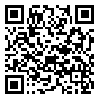BibTeX | RIS | EndNote | Medlars | ProCite | Reference Manager | RefWorks
Send citation to:
URL: http://jdc.tums.ac.ir/article-1-51-en.html
Background and Aim: Tumor angiogenesis is essential for tumor growth and appears to play an importating role both in invasive growth and metastasis. Basal cell carcinomas (BCCs) and squamous cell carcinomas (SCCs) of the skin are derived from a similar cell type but differ in the invasive and metastatic potential. Basal cell carcinoma generally shows a relatively benign course in contrast to squamous cell carcinoma .This study investigates whether the behavior of these tumors could be explained by differences in their angiogenesis pattern.
Methods: Vessel counts were made of blood vessels in stroma and the body of 50 variants of BCC of skin samples including: nodular, micronodular, sclerosing and superficial, both after H&E and immunohistochemical staining for CD31 and CD34 markers.
Results: The body vessel counts of invasive variants (sclerosing & micronodular) differed significantly from the counts of noninvasive variants (nodular and superficial) using both CD31 & CD34 markers. The stromal vessel counts compared between invasive and noninvasive variants showed no significantly difference using CD31 & CD34 markers, respectively.
Conclusion: The invasive growth pattern of BCC variants correlated with the microvascular density and according to results, vessel counts of the body play a more important role.
Received: 2010/08/25 | Accepted: 2010/10/20 | Published: 2013/07/16
| Rights and permissions | |
 |
This work is licensed under a Creative Commons Attribution-NonCommercial 4.0 International License. |





